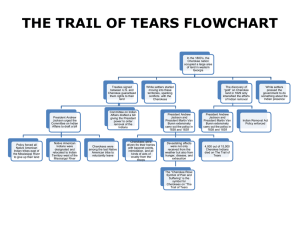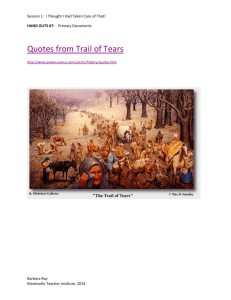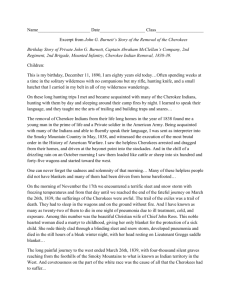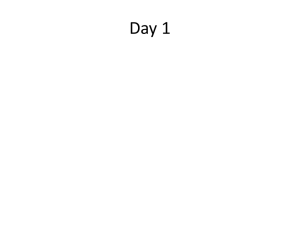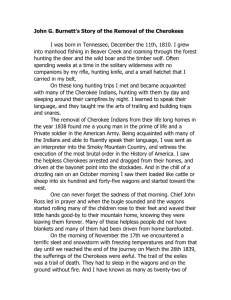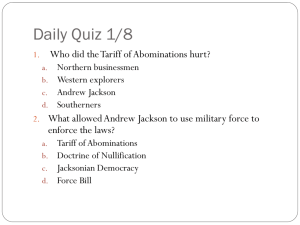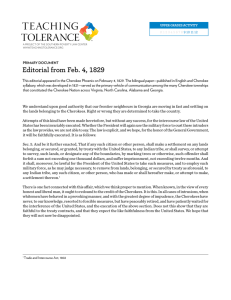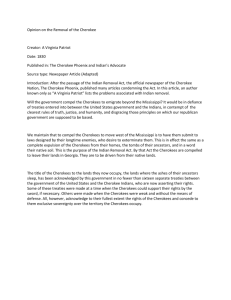Trail of Tears Primary Sources
advertisement
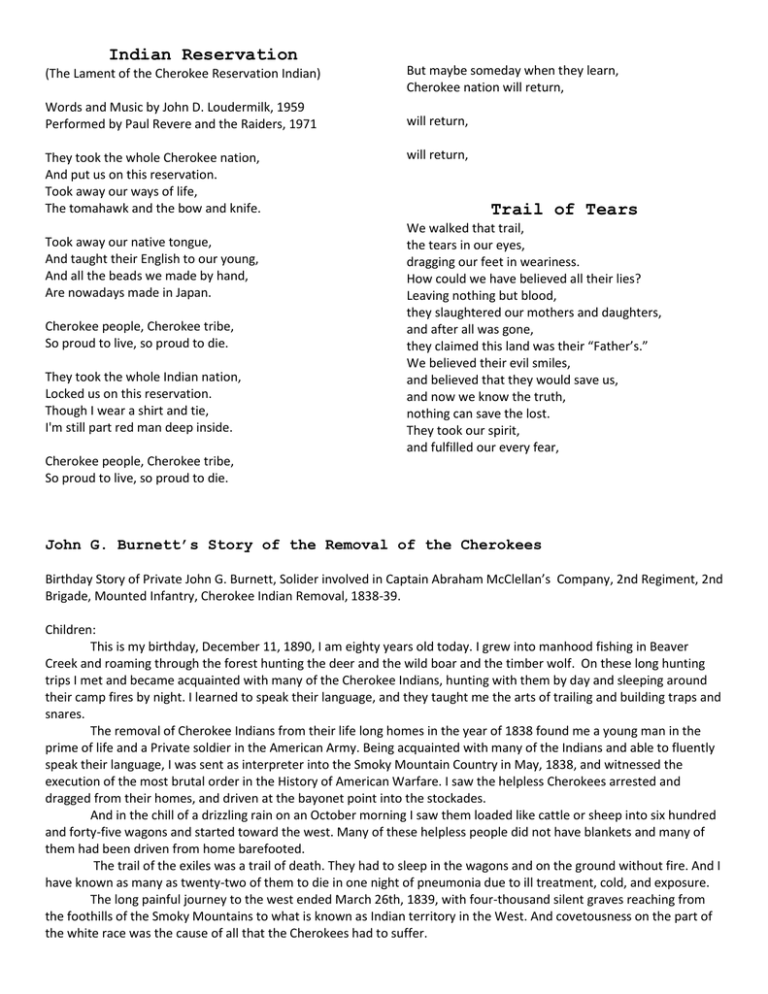
Indian Reservation (The Lament of the Cherokee Reservation Indian) But maybe someday when they learn, Cherokee nation will return, Words and Music by John D. Loudermilk, 1959 Performed by Paul Revere and the Raiders, 1971 will return, They took the whole Cherokee nation, And put us on this reservation. Took away our ways of life, The tomahawk and the bow and knife. Took away our native tongue, And taught their English to our young, And all the beads we made by hand, Are nowadays made in Japan. Cherokee people, Cherokee tribe, So proud to live, so proud to die. They took the whole Indian nation, Locked us on this reservation. Though I wear a shirt and tie, I'm still part red man deep inside. will return, Trail of Tears We walked that trail, the tears in our eyes, dragging our feet in weariness. How could we have believed all their lies? Leaving nothing but blood, they slaughtered our mothers and daughters, and after all was gone, they claimed this land was their “Father’s.” We believed their evil smiles, and believed that they would save us, and now we know the truth, nothing can save the lost. They took our spirit, and fulfilled our every fear, Cherokee people, Cherokee tribe, So proud to live, so proud to die. John G. Burnett’s Story of the Removal of the Cherokees Birthday Story of Private John G. Burnett, Solider involved in Captain Abraham McClellan’s Company, 2nd Regiment, 2nd Brigade, Mounted Infantry, Cherokee Indian Removal, 1838-39. Children: This is my birthday, December 11, 1890, I am eighty years old today. I grew into manhood fishing in Beaver Creek and roaming through the forest hunting the deer and the wild boar and the timber wolf. On these long hunting trips I met and became acquainted with many of the Cherokee Indians, hunting with them by day and sleeping around their camp fires by night. I learned to speak their language, and they taught me the arts of trailing and building traps and snares. The removal of Cherokee Indians from their life long homes in the year of 1838 found me a young man in the prime of life and a Private soldier in the American Army. Being acquainted with many of the Indians and able to fluently speak their language, I was sent as interpreter into the Smoky Mountain Country in May, 1838, and witnessed the execution of the most brutal order in the History of American Warfare. I saw the helpless Cherokees arrested and dragged from their homes, and driven at the bayonet point into the stockades. And in the chill of a drizzling rain on an October morning I saw them loaded like cattle or sheep into six hundred and forty-five wagons and started toward the west. Many of these helpless people did not have blankets and many of them had been driven from home barefooted. The trail of the exiles was a trail of death. They had to sleep in the wagons and on the ground without fire. And I have known as many as twenty-two of them to die in one night of pneumonia due to ill treatment, cold, and exposure. The long painful journey to the west ended March 26th, 1839, with four-thousand silent graves reaching from the foothills of the Smoky Mountains to what is known as Indian territory in the West. And covetousness on the part of the white race was the cause of all that the Cherokees had to suffer. At this time, 1890, we are too near the removal of the Cherokees for our young people to fully understand the enormity of the crime that was committed against a helpless race. Truth is, the facts are being concealed from the young people of today. School children of today do not know that we are living on lands that were taken from a helpless race at the bayonet point to satisfy the white man’s greed. Future generations will read and condemn the act and I do hope posterity will remember that private soldiers like myself, and like the four Cherokees who were forced by General Scott to shoot an Indian Chief and his children, had to execute the orders of our superiors. We had no choice in the matter. I can truthfully say that I did my best for them when they certainly did need a friend. Twenty-five years after the removal I still lived in their memory as "the soldier that was good to us". Murder is murder, and somebody must answer. Somebody must explain the streams of blood that flowed in the Indian country in the summer of 1838. Somebody must explain the 4000 silent graves that mark the trail of the Cherokees to their exile. I wish I could forget it all, but the picture of 645 wagons lumbering over the frozen ground with their cargo of suffering humanity still lingers in my memory. Jackson Warns the Seminoles My ChildrenI am sorry to have heard that you have been listening to bad counsel. You know that I would not deceive nor advise you to do anything that was unjust or harmful. Open your ears and attend to what I shall now say to you. They are the words of a friend and words of truth. The white people are settling around you. The game has disappeared from your country. Your people are poor and hungry. Even if you had a right to stay, how could you live where you now are? You have sold all your country. You have not a piece as large as a blanket to sit down upon. What is to support yourselves, your women, and children? Now is it not better peaceably to move to a fine, fertile country, occupied by your own kindred, where you can raise all the necessities of life, and where game is yet abundant? The annuities payable to you and the other arrangements made in your favor will make your situation comfortable. They will enable you to increase and improve. If, therefore, you had a right to stay, where you now are, still every true friend would advise you to move. But you have no right to stay, and you must go. I am very desirous that you should go peaceably and voluntarily. You shall be comfortably taken care of and kindly treated on the road. But in case some of your rash young men should forcibly oppose your arrangements for removal, I have ordered a large military force to be sent among you. If you listen to the voice of friendship and truth, you will go quietly and voluntarily. But should you listen to the bad birds that are always flying about you and refuse to move, I have then directed the commanding officer to remove you by force. This will be done. I pray the Great Spirit, therefore, to incline you to do what is right. Your friend, A. Jackson Washington, February 16, 1835
